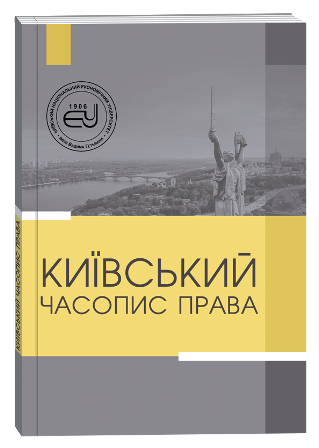CONTRACT WITH ACADEMIC STAFF: EUROPEAN AND INTERNATIONAL EXPERIENCE
DOI:
https://doi.org/10.32782/klj/2025.2.22Keywords:
labor relations, scientific and pedagogical worker, criteria for selection for positions, competition for vacant positions, employment contract/contract with a scientific and pedagogical worker, social and legal guarantees for scientific and pedagogical workers, academic freedomAbstract
The article provides a thorough comparative legal analysis of contemporary models of contractual relations with scientific and pedagogical workers (SPW) in leading higher education systems: the European Union, the United States of America, the People’s Republic of China, and Ukraine. The author analyzes the peculiarities of regulating labor relations in higher education, paying particular attention to the legal nature of the contract, the duration of employment, performance evaluation mechanisms, social guarantees, and the promotion of academic mobility. Within the European approach, the article examines the effect of Directive 1999/70/EC on the prevention of abuse of fixed-term employment contracts, as well as the provisions of the European Charter for Researchers (2005), which provide for transparent criteria for concluding and renewing contracts, in particular through the introduction of KPI (Key Performance Indicators) tools. The article outlines the current challenges arising in the context of the growing segmentation of academic work, the precariousness of teaching activities, and the consequences of the widespread introduction of “zero-hour” contracts in some European countries. Particular attention is paid to the American tenure system – a model of permanent employment based on the principles of academic freedom, transparent competitive selection, and multi-level assessment. The advantages of this system are analyzed, in particular the high level of job satisfaction and stability among teachers, as well as its disadvantages – the limited number of positions and the high financial burden on universities. The Chinese model presents the concept of a “comprehensive contract” that combines elements of labor and administrative law. The reforms introduced in 2014 provide for the preservation of the public law mandate of educational activities, flexible standards for evaluating work, and limited freedom to terminate employment relationships early. The content of subordination, the social order of the state, and legal restrictions on teacher autonomy are analyzed in detail. The Ukrainian context is presented through the prism of legislative changes, in particular the removal from the Law of Ukraine “On Higher Education” of the provision on the competitive procedure for concluding contracts with NPPs, which potentially creates conflicts with the provisions of the Law of Ukraine “On Scientific and Scientific and Technical Activity.” The article emphasizes the need to improve legislation on labor relations in higher education, in particular by establishing a clear legal framework for the application of contracts, harmonization with international approaches, strengthening social protection, and encouraging teacher mobility.
References
Council Directive 1999/70/EC of 28 June 1999 concerning the framework agreement on fixed-term work // Official Journal, L 175, 10.07.1999. URL: https://eur-lex.europa.eu/eli/dir/1999/70/oj/eng (дата звернення: 12.06.2025).
1940 Statement of Principles on Academic Freedom and Tenure. American Association of University Professors. URL: https://www.aaup.org/report/1940-statement-principles-academic-freedom-and-tenure-1970-interpretive-comments (дата звернення: 12.06.2025).
Teachers Law of the People’s Republic of China. Adopted 1993. URL: https://en.moe.gov.cn/Resources/Laws_and_Policies/201506/t20150626_191389.html (дата звернення: 12.06.2025).
Permanent contracts and job satisfaction in academia: evidence from European countries / F. Castellacci, C. Viñas-Bardolet // Studies in Higher Education. 2020. URL: https://doi.org/10.1080/03075079.2019.1711041 (дата звернення: 12.06.2025).
The State of Academic Careers in OECD Countries. OECD, 2024. URL: https://www.oecd.org/en/publications/the-state-of-academic-careers-in-oecd-countries_ea9d3108-en.html (дата звернення: 12.06.2025).
Driving Impact of Erasmus+ Outgoing Academic Staff Mobility: Current Landscape and Pathways for the Future. ACA, 2023. URL: https://aca-secretariat.be/… (дата звернення: 12.06.2025).
Erasmus+ Annual Report 2022. European Commission. URL: https://erasmus-plus.ec.europa.eu/news/2022-support-presented-in-latest-annual-report (дата звернення: 12.06.2025).
ArXiv Survey of Stress and Tenure in Academia / J. Berengueres, P. Nesterov. 2020. URL: https://arxiv.org/abs/2010.00358 (дата звернення: 12.06.2025).
Ministry of Education of the People’s Republic of China. – Published 26 June 2015. – URL:: http://en.moe.gov.cn/Resources/Laws_and_Policies/201506/t20150626_191389.html (дата звернення: 28.06.2025).
Comparative Study of Higher Education Academic Staff Terms and Conditions. Higher Education Policy Institute. May 2023. URL: https://sums.org.uk/… (дата звернення: 12.06.2025).
Про вищу освіту : Закон України від 01.07.2014 р. № 1556-VII. URL: https://zakon.rada.gov.ua/go/1556-18 (дата звернення: 12.06.2025).
Про наукову і науково-технічну діяльність : Закон України від 26.11.2015 р. № 848-VIII. URL: https://zakon.rada.gov.ua/go/848-19 (дата звернення: 12.06.2025).
Кодекс законів про працю України : Закон України від 10.12.1971 р. № 322-VIII. URL: https://zakon.rada.gov.ua/laws/show/322-08#Text (дата звернення: 12.06.2025).
Li Yong, Xu Lei, Sun Lu. On the Compound Legal Nature of Teachers’ Employment Contract in Public Universities of China // US-China Law Review. – 2022. – Vol. 19, No. 5. – P. 236–250. – DOI: 10.17265/1548-6605/2022.05.004. – URL: https://www.davidpublisher.com/Public/uploads/Contribute/62d7bfdd0a037.pdf








